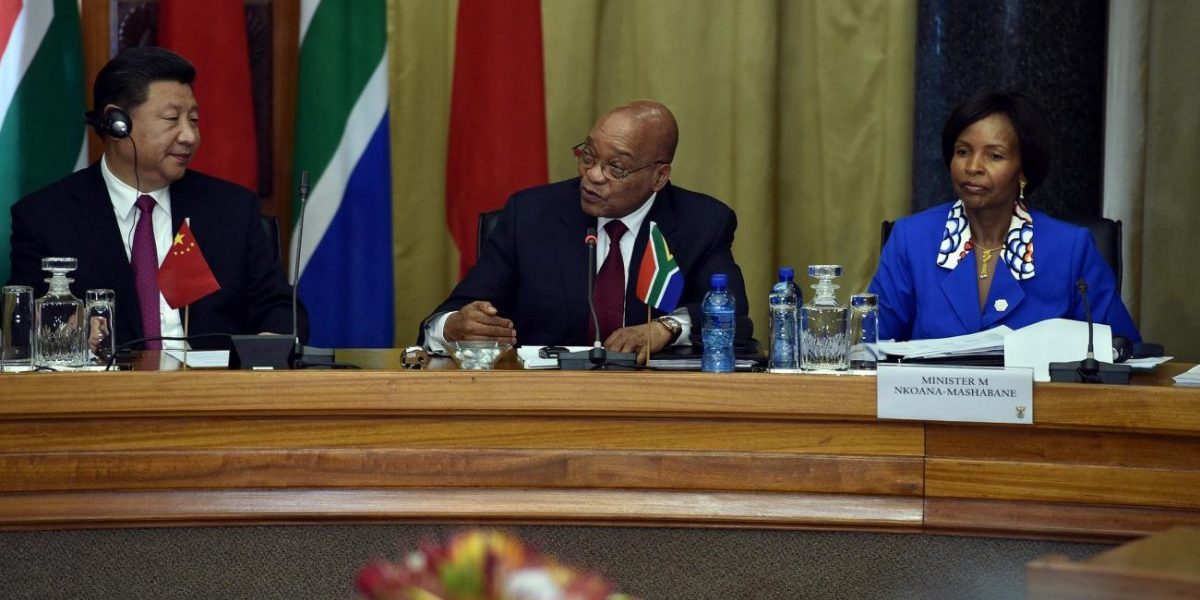With the largest business delegation to date, South Africa hopes that warm political and mushrooming economic relations will help address some of its pressing domestic socio-economic challenges. From the outset, a central element of the Zuma administration’s foreign policy was to assert the link between domestic socio-economic priorities and South Africa’s international relations. This means that if jobs, education and poverty eradication are key priorities at home, SA’s approach to its foreign relations should reflect this. Strengthening South-South relations, especially against the background of the developed world’s economic difficulties, is viewed as an important vehicle in this regard.
China is both an important partner at a political and economic level for SA, but equally one which has elicited criticism from some quarters, especially in the trade union movement where it has been accused of being responsible for the loss of jobs in certain manufacturing sectors.
At the political level, SA regards China as a key player in the global debates that characterise the shift to multipolarity. China’s developing country status, its identification as a member of the Global South and the G77 in the UN are elements that carry significance for SA too. In recent years, China’s growing role in peacekeeping in Africa also points to potential synergies with SA’s own African peace and security priorities. Furthermore, over the last two decades the links between the Chinese Communist Party and the ANC have deepened, with regular exchanges between the two taking place.
Economically, the growth in two-way trade and investment since the start of diplomatic relations in 1998 has allowed SA to diversify its commercial relations away from their traditional northern axis, but it has not been without its challenges. Three points are worth mentioning here: First, trade between the two replicates traditional North-South patterns, where SA largely exports raw materials and imports manufactured goods. One way to diversify SA exports to China is through the removal of non-tariff barriers that are holding back the export potential of other very promising sectors of SA’s economy, namely agriculture – a path followed by Brazil, which faces the same challenges in its relations with China. Over the last few years, Brazil, with much patience, has achieved some success in this endeavour.
Second, China’s global competitiveness makes it difficult for SA, with its high-cost structure in some sectors, to compete. SA’s reluctance to proceed with a free trade agreement with China reflects concerns about the threat it may present to the survival of the local labour-intensive industry (namely textiles and clothing), although a recent study by the Trade Law Centre indicated that expected losses (fall in employment, wages and manufactures production) would be largely offset by gains in other sectors with a stronger competitive potential (chemicals, plastics, non-ferrous metals, machinery). SA’s decision to implement its own industrial strategy to address the erosion of its industrial base and job losses is also an important factor.
Third, Chinese investment in SA is smaller than SA’s into China. Despite the strong Chinese appetite for SA mining resources and the attractiveness of its open market, SA’s significantly more complex socio-economic structure (with strong labour unions and a large industrial base) compared with other African countries, has largely constrained the expansion of Chinese interests in Africa’s largest economy. In 2008 discussions between the two states focused on negotiating a Partnership for Growth and Development, which would include market access for value-added and beneficiated products from SA. The early departure of President Mbeki from office saw that initiative delayed although not for long. In March this year business deals worth more than R2.3 billion were signed. These included SA supplying more goods to China, including mohair, fish, wine, wool, copper, manganese, granite blocks and ferrochrome. The Comprehensive Strategic Partnership signed in Beijing this week, the first of its kind ever put forward by China with another country, recognises the need to address these issues going forward.
The strong business focus of the visit indicates both the opportunities that SA companies see in China, but also the centrality of commercial diplomacy in creating more jobs and attracting investments back home. From a SA government perspective it is important that China’s investments should help promote SA’s industrial policy and development strategy. Conversely, a comprehensive effort should be made to improve and multiply the opportunities for South African enterprises to penetrate the Chinese market.
South Africa is at a critical crossroads in its domestic socio-economic development. While the strength of the big emerging economies presents many opportunities to generate higher rates of growth and jobs at home, these same countries are competitors both economically and politically globally and in Africa, where SA has enjoyed some competitive advantage. This is the challenge in deepening the relationship between SA and China. Both recognise the importance of the other. For China, SA is a major player in Africa and thus an important partner in its broader African engagement strategy. However, the real test for the Comprehensive Strategic Partnership will be in the degree to which it becomes an effective vehicle for creating more jobs and realising the objective of a more diversified SA economy.








